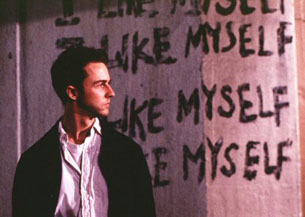Viking Night
Fight Club
By Bruce Hall
February 23, 2010
I recently paid an impromptu visit to a friend, who'd been begging me to drop by and see his new 47 inch HDTV. For weeks now I'd listened to rapturous tales of wonder and fascination regarding it, as though possessing this device was going to change his life in some fantastic, spiritual way. When it finally arrived, I was regaled with miraculous tales of how much better it was to watch television in HD. To listen to him, you'd have thought that having a regular TV all these years was the worst thing that could happen to a person, sort of like being forced to make license plates on an island in the middle of a sulfur lake in the bowels of hell for a thousand years. Far be it for me to take away from someone's happiness, but I had to privately wonder whether or not watching Survivor in HD actually made the show any better. But being the good friend I am, I decided to drop by one day and check it out. Soon, there we sat on the sectional in silence, glumly watching The Ellen DeGeneres Show.
I felt confused, as I'd been under the impression that as two red blooded American males with an HDTV and several hours to kill, we were going to watch something that involved sports, jet planes, ninjas or giant robots. After a series of furtive glances, my friend explained that there was "nothing on" any of the at least 350 HD channels available. I had my doubts about that, but suggested that we didn't have to watch television - to which he responded there was "nothing else to do." Here we were, two members of the same species that invented Democracy, the internal combustion engine and the space shuttle, rotting away on a couch in a Midwestern suburb because there was "nothing to do." I was raised to believe that if you think there's "nothing to do" it's because you're too lazy to do anything. But there was more to it than that. If there's "nothing to do" but watch television, is having a better television going to solve your problem? Have we really been so thoroughly trained to believe that the things we already have aren't good enough and that if only we replaced them with new ones our lives would improve?
We exist in the wealthiest, most advanced society the world has ever seen, and we have access at any time to almost anything we'd like to eat, drink or experience. If you have an Internet connection, almost the sum total of human knowledge is at your fingertips at any given time. Yet despite this, so many of us are constantly bored, unhappy, restless and disillusioned. We have "nothing to do" – other than toil away thanklessly at jobs we don't want, struggling to pay off the mountain of debt we've accrued for all of the wonderful things we have but don't need. Granted, this doesn't describe everyone, but it's hard to deny an ever growing identity crisis amongst our middle class. As more of us acquire the ability to have the things we've always wanted we often find that having the things you want only makes you want to have more of the things you don't. At times, it seems as though the larger and more complex the world becomes, the smaller and more insignificant is our shared humanity. Some say that we've exchanged meaningful human interaction with the need to indulge ourselves in material wanderlust – and that this has created a class of people constantly on the verge of despair. This is in part the subject of Chuck Palahniuk's 1996 novel Fight Club, and the 1999 film of the same name.
Continued:
1
2
3
|
|
|
|




